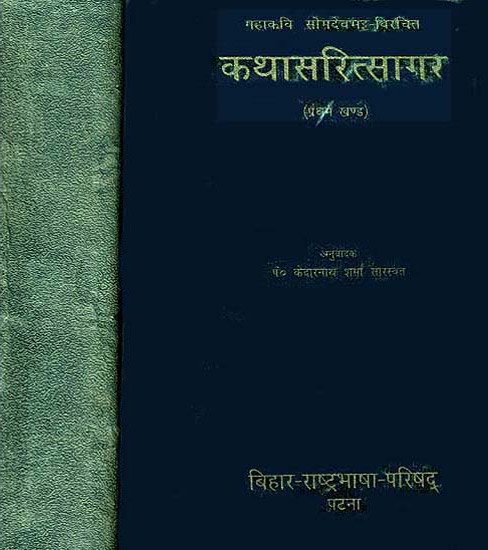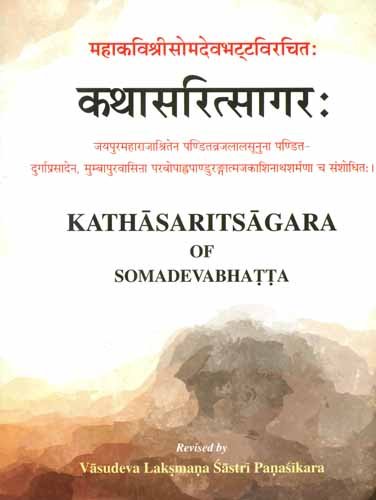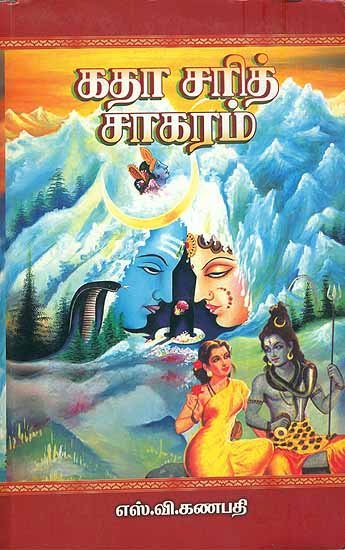Kathasaritsagara [sanskrit]
by C. H. Tawney | 2014 | 226,424 words | ISBN-13: 9789350501351
The Sanskrit edition of the Kathasaritsagara referencing the English translation and grammatical analysis. Written by Somadeva and dating from the 12th century, the Kathasaritsagara (or Katha-sarit-sagara) represents an epic legend narrating the adventures of Naravahanadatta as he strives to become the destined emperor of the Vidyadharas. Alternative titles: (Kathāsaritsāgara, कथासरित्सागर, Kathā-sarit-sāgara)
Verse 15.2.139
पुत्रैतेषु सचेतनो न रमते दिव्येषु भोगेषु कः किं वाकर्षति जन्मभूमिवसतिस्नेहः स्वको मानुषान् ।
तद्यामः स्वपुरीं वयं श्रियमिमां वद्याधरीं त्वं पुनर् भुङ्क्ष्वैतास्तव दिव्यमानुषतया योग्या यतो भूमयः ॥ १३९ ॥
putraiteṣu sacetano na ramate divyeṣu bhogeṣu kaḥ kiṃ vākarṣati janmabhūmivasatisnehaḥ svako mānuṣān |
tadyāmaḥ svapurīṃ vayaṃ śriyamimāṃ vadyādharīṃ tvaṃ punar bhuṅkṣvaitāstava divyamānuṣatayā yogyā yato bhūmayaḥ || 139 ||
The English translation of Kathasaritsagara Verse 15.2.139 is contained in the book The Ocean of Story by C.H. Tawney. This book is available online or you could buy the latest edition:
Read online Buy now! The English translation by C.H. Tawney (2014)
Glossary of Sanskrit terms
Note: This extracts Sanskrit terms and links to English definitions from the glossary, based on an experimental segmentation of verse (15.2.139). Some terms could be superfluous while some might not be mentioned. Click on the word to show English definitions.
Putra, Eta, Etad, Esha, Sacetana, Ramati, Ramat, Divya, Bhoga, Kah, Kim, Vaka, Vasati, Vasat, Sneha, Svaka, Manusha, Tad, Tat, Yama, Svapu, Vaya, Asmad, Shri, Shriya, Iyam, Idam, Vadya, Vadi, Dha, Tva, Yushmad, Punar, Divyamanusha, Taya, Yogya, Yogi, Yatah, Yat, Yata, Bhumaya, Bhumi,
Analysis of Sanskrit grammar
Note: this is an experimental feature and only shows the first possible analysis of the Sanskrit text (Kathasaritsagara Verse 15.2.139). If the system was successful in segmenting the sentence, you will see of which words it is made up of, generally consisting of Nouns, Pronouns, Verbs, Participles and Indeclinables. Click on the link to show all possible derivations of the word.
- Line 1: “putraiteṣu sacetano na ramate divyeṣu bhogeṣu kaḥ kiṃ vākarṣati janmabhūmivasatisnehaḥ svako mānuṣān ”
- putrai -
-
putra (noun, masculine)[compound], [vocative single]putra (noun, neuter)[compound], [vocative single]putrā (noun, feminine)[nominative single]
- eteṣu -
-
eta (noun, masculine)[locative plural]eta (noun, neuter)[locative plural]etad (noun, neuter)[locative plural]eṣa (noun, masculine)[locative plural]
- sacetano* -
-
sacetana (noun, masculine)[nominative single]
- na -
-
na (indeclinable particle)[indeclinable particle]na (noun, masculine)[compound], [vocative single]na (noun, neuter)[compound], [vocative single]
- ramate -
-
ramati (noun, feminine)[vocative single]ramati (noun, masculine)[vocative single]√ram -> ramat (participle, masculine)[dative single from √ram class 1 verb]√ram -> ramat (participle, neuter)[dative single from √ram class 1 verb]√ram (verb class 1)[present middle third single]
- divyeṣu -
-
divya (noun, masculine)[locative plural]divya (noun, neuter)[locative plural]
- bhogeṣu -
-
bhoga (noun, masculine)[locative plural]bhoga (noun, neuter)[locative plural]
- kaḥ -
-
kaḥ (indeclinable interrogative)[indeclinable interrogative]ka (noun, masculine)[nominative single]kaḥ (pronoun, masculine)[nominative single]
- kim -
-
kim (indeclinable interrogative)[indeclinable interrogative]kim (indeclinable)[indeclinable]kim (pronoun, neuter)[nominative single], [accusative single]
- vākar -
-
vāka (noun, masculine)[compound], [vocative single]vāka (noun, neuter)[compound], [vocative single]vākā (noun, feminine)[nominative single]
- ṛṣati -
-
√ṛṣ (verb class 6)[present active third single]
- janmabhūmi -
-
janmabhūmi (noun, feminine)[compound], [adverb]
- vasati -
-
vasati (noun, feminine)[compound], [adverb]vasati (noun, masculine)[compound], [adverb]vasati (noun, neuter)[compound], [adverb], [nominative single], [vocative single], [accusative single]vasatī (noun, feminine)[adverb], [vocative single]√vas -> vasat (participle, masculine)[locative single from √vas class 1 verb]√vas -> vasat (participle, neuter)[locative single from √vas class 1 verb]√vas (verb class 1)[present active third single]
- snehaḥ -
-
sneha (noun, masculine)[nominative single]
- svako* -
-
svaka (noun, masculine)[nominative single]
- mānuṣān -
-
mānuṣa (noun, masculine)[accusative plural]
- Line 2: “tadyāmaḥ svapurīṃ vayaṃ śriyamimāṃ vadyādharīṃ tvaṃ punar bhuṅkṣvaitāstava divyamānuṣatayā yogyā yato bhūmayaḥ ”
- tad -
-
tad (indeclinable)[indeclinable]tad (indeclinable adverb)[indeclinable adverb]tat (indeclinable correlative)[indeclinable correlative]tad (noun, neuter)[compound], [nominative single], [accusative single]
- yāmaḥ -
-
yāma (noun, masculine)[nominative single]√yā (verb class 2)[present active first plural]
- svapu -
-
svapū (noun, feminine)[adverb], [vocative single]
- rī -
-
rī (noun, feminine)[compound], [adverb]rai (noun, masculine)[adverb]
- im -
-
i (noun, masculine)[accusative single]
- vayam -
-
vaya (noun, masculine)[adverb], [accusative single]vayā (noun, feminine)[adverb]asmad (pronoun, none)[nominative dual]
- śriyam -
-
śriyā (noun, feminine)[adverb]śriya (noun, masculine)[adverb], [accusative single]śriya (noun, neuter)[adverb], [nominative single], [accusative single]śrī (noun, feminine)[accusative single]śrī (noun, masculine)[accusative single]
- imām -
-
iyam (noun, feminine)[accusative single]idam (pronoun, feminine)[accusative single]
- vadyā -
-
vadyā (noun, feminine)[nominative single]√vad -> vadyā (participle, feminine)[nominative single from √vad class 1 verb]vadi (noun, feminine)[instrumental single]
- dha -
-
dha (noun, masculine)[compound], [vocative single]dha (noun, neuter)[compound], [vocative single]
- rī -
-
rī (noun, feminine)[compound], [adverb]rai (noun, masculine)[adverb]
- im -
-
i (noun, masculine)[accusative single]
- tvam -
-
tva (noun, neuter)[adverb], [nominative single], [accusative single]tva (noun, masculine)[accusative single]yuṣmad (pronoun, none)[nominative single]
- punar -
-
punar (indeclinable adverb)[indeclinable adverb]punar (indeclinable)[indeclinable]
- bhuṅkṣvai -
-
√bhuj (verb class 7)[imperative middle second single]
- etās -
-
eta (noun, masculine)[nominative plural], [vocative plural]etā (noun, feminine)[nominative plural], [vocative plural], [accusative plural]eṣā (noun, feminine)[nominative plural], [accusative plural]
- tava -
-
yuṣmad (pronoun, none)[genitive single]
- divyamānuṣa -
-
divyamānuṣa (noun, masculine)[compound], [vocative single]
- tayā* -
-
taya (noun, masculine)[nominative plural], [vocative plural]
- yogyā* -
-
yogya (noun, masculine)[nominative plural], [vocative plural]yogyā (noun, feminine)[nominative plural], [vocative plural], [accusative plural]√yuj -> yogya (participle, masculine)[nominative plural from √yuj class 7 verb], [vocative plural from √yuj class 7 verb]√yuj -> yogyā (participle, feminine)[nominative plural from √yuj class 7 verb], [vocative plural from √yuj class 7 verb], [accusative plural from √yuj class 7 verb]yogī (noun, feminine)[ablative single], [genitive single]
- yato* -
-
yataḥ (indeclinable relative)[indeclinable relative]yataḥ (indeclinable)[indeclinable]yat (noun, masculine)[accusative plural], [ablative single], [genitive single]yat (noun, neuter)[ablative single], [genitive single]yata (noun, masculine)[nominative single]√i -> yat (participle, masculine)[accusative plural from √i class 2 verb], [ablative single from √i class 2 verb], [genitive single from √i class 2 verb]√i -> yat (participle, neuter)[ablative single from √i class 2 verb], [genitive single from √i class 2 verb]√yam -> yata (participle, masculine)[nominative single from √yam class 1 verb]
- bhūmayaḥ -
-
bhūmaya (noun, masculine)[nominative single]bhūmi (noun, feminine)[nominative plural], [vocative plural]bhūmi (noun, masculine)[nominative plural], [vocative plural]
Other editions:
Also see the following editions of the Sanskrit text or (alternative) English translations of the Kathasaritsagara Verse 15.2.139
Kathasaritsagar
by Kedarnath Sharma Saraswat (2005)
The Only Edition with the Sanskrit Text and its Hindi Translation (An Old and Rare Book) Set of 3 Vol.
Buy now!
Kathasaritsagara of Somadeva Bhatta (Sanskrit Text Only)
by Vasudeva Laksmana Sastri (2013)
Katha Sarit Sagar in Marathi
by H. A Bhave (1995)
Set of 5 Volumes; Published by Varada Books, Pune. 2256 pages (Throughout B/W Illustrations).
Buy now!
Katha Sarit Sagara (Tamil)
by S. V. Ganapati (எஸ். வி. கணபதி) (2014)
[கதா சரித் சாகரம்] Published by Alliance Publications.
Buy now!
Galpa Shono
by Abhijit Chattopadhyay (2014)
[গল্প শোনো] Galpa Shono: Bengali Translation of 'Suno Kahani From Katha Sarit Sagar'; 9788126015436; Published by Sahitya Akademi, Delhi.
Buy now!Preview of verse 15.2.139 in Bengali sript:
পুত্রৈতেষু সচেতনো ন রমতে দিব্যেষু ভোগেষু কঃ কিং বাকর্ষতি জন্মভূমিবসতিস্নেহঃ স্বকো মানুষান্ ।
তদ্যামঃ স্বপুরীং বযং শ্রিযমিমাং বদ্যাধরীং ত্বং পুনর্ ভুঙ্ক্ষ্বৈতাস্তব দিব্যমানুষতযা যোগ্যা যতো ভূমযঃ ॥ ১৩৯ ॥
![Kathasaritsagara [sanskrit] - book cover](/uploads/a/Katha-Sarit-Sagara.jpg)




